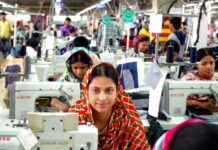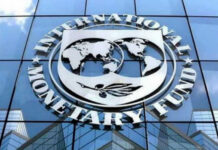Garment factory owners have agreed to a monthly minimum wage of Tk 5,300 for their employees.
Owners of the woven and knitwear factories officially agreed to the new wage in a meeting with Prime Minister Sheikh Hasina at her official residence, said wage board negotiator Arshad Jamal.
“The BGMEA and BKMEA representatives have agreed to the new scale.”
He said although the owners would have preferred a bit more time, the hiked wages were likely to be introduced next month.
“It will be implemented as soon as the gazette comes out. So, most probably, it will be from Dec 1.”
Bangladesh is the second largest exporter of garment products, trailing only China.
The sector that accounts for nearly 80 percent of the total export income employs nearly four million people, most of them women.
The owners’ bodies had previously threatened to shut down their factories if they were forced to pay the proposed hike.
Wednesday’s meeting took place amid brewing workers’ unrest at Savar, Ashulia, Gazipur and other places demanding implementation of the minimum wage.
Labour Minister Rajiuddin Ahmed Raju, State Minister for Labour Monnujan Sufian, Labour Secretary Mikail Shipar, BGMEA President Atiqul Islam, among others, were present.
Shipar said the garment owners had agreed to the Wage Board’s proposal at the Prime Minister’s intervention.
“The Prime Minister assured them (the owners) of looking into their problems and asked them to agree to the minimum Tk 5,300 wage.”
In Bangladesh, the regulation for fixing minimum wage after every five years has never been followed.
On Jul 27, 2010, the workers’ minimum wage was fixed at Tk 3,000.
The $20 billion industry has been accused of not properly following the wage board’s recommendations.
Top importers of Bangladesh’s garment products pressed the government to provide the workers with better safety and wage after last November’s Tazreen Fashions fire killing over 110 workers and this year’s Rana Plaza collapse killing over 1,100 people.
The European Union (EU), Bangladesh’s largest importer of garment products, threatened to cancel the duty-free access of goods into its market.
After the Rana Plaza collapse, the US suspended Bangladesh’s Generalised System of Preferences (GSP), a special trade privilege for some selected goods except garment.
In an apparent bid to pacify Western buyers, the government announced a wage board last June to revise the pay of the garment workers.
Headed by former District Judge Amulya Kumar Roy, the board had representatives of the owners and workers. Dhaka University Professor Kamaluddin Ahmed was included as a ‘neutral’ member.
The owners and workers were divided in their opinion on the issue. The workers demanded a Tk 8,000 minimum wage but the owners had been refusing to give anything more than Tk 4,200.
As the workers took to the streets, the government-appointed board prescribed a minimum Tk 5,300 wage on Nov 4.
Representatives of the owners had left the meeting that day.
Later, the BGMEA said they did not have financial strength to pay the proposed salary.
Several workers’ bodies are still waging demonstrations demanding Tk 8,000 in minimum wage.
Source: Bd news24










